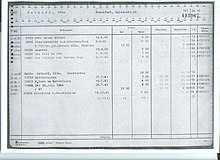Otto Osthoff
Otto Osthoff (born March 6, 1906 in Barmen ; † April 1, 1957 in Frankfurt am Main ) was a German actor, director, co-founder and head of the Munich Schaubude and editor of the two magazines Das literäre Kabarett and Die Ewige Komödie .
Life
Otto Osthoff became a half-orphan at the age of three, as his father of the same name died at the age of 32. He attended the Sedanstrasse grammar school and the state secondary school in Elberfeld. In 1924 and 1925, Osthoff tried to get an apprenticeship at the Düsseldorf Schauspielhaus (private theater by Louise Dumont and Gustav Lindemann ) at the School of Performing Arts affiliated there. According to the correspondence available in the theater museum, the training contract did not materialize. In the 1925/26 season, however, he played batches at the Stadttheater Düsseldorf.
Seasons 1935–1939 in Hanover and Breslau
In August 1934, Osthoff and his friend Siegfried Lowitz moved from Mainz to Hanover . There he played from 1935 to 1936 at the Städtische Bühnen in plays by Oscar Wilde , Heinrich Zerkaulen and Friedrich Schiller . In 1936 he moved to the Städtische Bühnen in Breslau with a contract as a “youthful hero and lover” , from where he was on leave in December 1938 to Karlsbad and from January 1, 1939 to February 28, 1939 to Vienna . Contrary to the detailed description in Siegfried Lowitz's autobiography, the theater archive in Wrocław was unable to confirm that he, like Otto Osthoff, had been engaged at the theater in Breslau.
Münchner Kammerspiele, foundation of the Munich Schaubude
After Otto Osthoff took part in the Münchner Kammerspiele in the Otto Falckenbergs ensemble from 1941–1948 , he dared to take the “first step” on August 15, 1945 in the Munich Kammerspiele with the “ Schaubude ”, which had been used by the Americans as a cinema and vaudeville since the end of the war relational program title was called. On April 21, 1946, together with Rudolf Schündler , he began the “provisional arrangement with a lot of dance, with a lot of borrowing from world literature and yet with the first energetic will to responsible topicality, to political cabaret. And this step was so well received that the best German minds: authors, composers, actors agreed to march with us, after twelve years of camouflage and lack of character, to this propaganda march for the young democracy ... "
Otto Osthoff also tried to achieve pragmatic goals by demanding that "the usual 'entertainment tax' for entertainment venues such as cabarets, circus and striptease places would be reduced from 20% income for the show booth to the usual 5% for theaters". For example Gwendolyn von Ambesser in her book “Schaubudenzauber”, in which a photograph by Osthoff is shown, as he appeared as “ Teng ” together with Sepp Nick and Bum Krüger in 1946 in the play “In 2000 years everything is over”.
As a film actor Otto Osthoff appeared in 1942 in the now lost documentary "Die See ruft" by Hans Fritz Köllner.
Editor of the magazines "Das literäre Kabarett" and "Ewige Komödie"
In 1946 and 1947 Otto Osthoff published two magazines in which artists from around the Munich Schaubude made contributions, but also works by deceased artists such as Frank Wedekind or Christian Morgenstern were quoted. The numerous illustrations were made by Dorul van der Heide. Karljakob Hirsch Karl Jakob Hirsch describes, for example, in Volume 2 of the "Literary Cabaret" in the article "Cabaret in the Emigration", how cabaret took place in Germany on a high intellectual level until 1933 and quotes Carl von Ossietzky , who told him shortly before his arrest : "You can't rant into the country across the border!"
Scandal in Hamburg
In 1951 there was a scandal in Hamburg because Osthoff did not reach the state-required guarantee amount of donations for the Altona Theater and supplemented the missing amount himself with forged receipts.

Radio announcer
From around 1953 Osthoff worked on numerous radio plays in the ARD stations . It is noticeable that he was only entered as deceased in the fee lists of the Hessischer Rundfunk in Frankfurt as of January 1961 - almost four years after the date of his death. As early as 1948 he was one of the main actors in the radio play Sturm im Wasserglas , which was produced by BR under the direction of Fritz Benscher . His partners included Rudolf Vogel and Annemarie Cordes .
literature
- Wilhelm Kosch : German Theater Lexicon (1949–1958)
- Gwendolyn von Ambesser : Show booth magic . Frankfurt am Main, 2006
- Heinz Greul : Boards that mean the world, cultural history of cabaret , Volume 2, Cologne 1971
- Edmund Nick , The literary cabaret, Die Schaubude 1945–1948. His story in letters and songs . Edited and commented by Dagmar Nick . 2004. ISBN 3-86520-026-5
- Siegfried Lowitz : What a life , Munich 2000
Web links
- Tax-free donations . In: Der Spiegel . No. 11 , 1951 ( online - with portrait photo).
- Otto Osthoff . In: Der Spiegel . No. 13 , 1953 ( online ).
- 6 radio plays with Otto Osthoff's role on HÖRDAT, the radio play database
- Otto Osthoff in the Internet Movie Database (English)
Individual evidence
- ^ Rudolf Schündler on March 11, 1947 in the NWDR
- ↑ weisse-rose-crailsheim.de
| personal data | |
|---|---|
| SURNAME | Osthoff, Otto |
| BRIEF DESCRIPTION | German actor and director |
| DATE OF BIRTH | March 6, 1906 |
| PLACE OF BIRTH | Barmen |
| DATE OF DEATH | April 1, 1957 |
| Place of death | Frankfurt am Main |